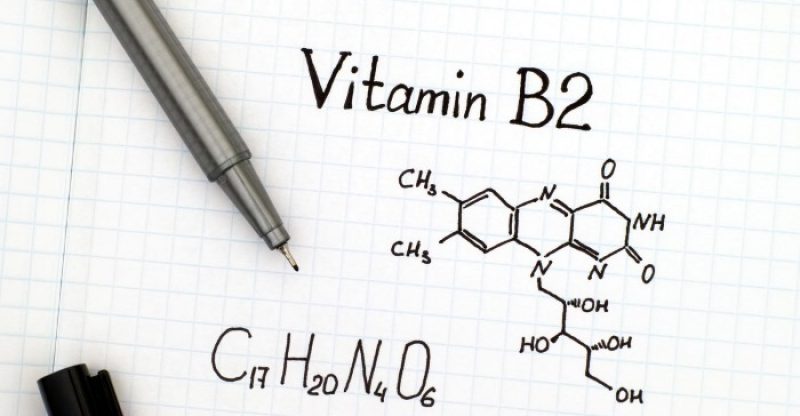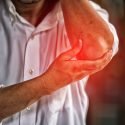13 Science-Backed Benefits of Vitamin B2 (Riboflavin)
What is Vitamin B2?
Vitamin B2, also known as Riboflavin, is one of the B-group vitamins that is essential to your body’s correct functioning.
Vitamin B2 is essential in maintaining the health of blood cells, increasing energy, regulating metabolism, preventing the cells from damage from free radicals, increasing growth, protecting the connective tissues in the body, and protecting you from different disorders.
Knowing the most important information about this vitamin can help you be more aware of the way that this essential nutrient can and should always be present inside of your body.
All B vitamins are water-soluble and are used up daily.
Water-soluble vitamins are carried directly into the bloodstream, and everything that is not used up is excreted via the urine.
The body does not store B2 in big quantities, and even that storage can be used up quickly.
That is why vitamin B2, like all other B vitamins, must be taken daily in order to avoid deficiency.
Since riboflavin is responsible for helping to digest food and utilize nutrients, it is extremely important to every cell of the body.
Riboflavin works together with the rest of the B vitamins.
It is especially important for utilizing vitamins B6 and folic acid.
Riboflavin works together with other nutrients and vitamins so that all the processes inside your body can run correctly.
Riboflavin deficiency is not too common, as the standard diet provides sufficient amounts of it, and some foods are additionally fortified.
Signs of Vitamin B2 Deficiency
According to USDA research, Vitamin B2 deficiency is not something that occurs often in developed nations, since most carbohydrate foods are fortified with it.
Westerners’ standard diet has lots of meat and eggs, and both of these foods are rich in riboflavin.
People who consume a gluten-free or a low-gluten diet should take a daily vitamin supplement as a precaution against deficiencies.
The recommended doses of Vitamin B2 are 1.3 mg/day for men and 1.1 mg/day for women.
Children and infants do not need as much, but still, need to take it daily.
Once a riboflavin deficiency has been diagnosed, a surplus dosage should be taken to replace the body’s stores and fix any existing problems stemming from a vitamin B2 lack (1).
There are a lot of symptoms that can occur from a lack of riboflavin.
Those symptoms include a migraine, eye problems, thyroid underperformance, and anemia.
Deficiency in vitamin B2, or ariboflavinosis, can have many different symptoms or a complex of symptoms.
These include:
- Anemia
- Fatigue
- Damaged nerves
- Slow metabolism
- Sores on the lips or mouth
- Inflammation of the skin around the nose and the face
- Enlarged mouth or tongue
- Sore throat
- Swelling of ligaments in the body
- Mood swings, anxiety, or depression
Pregnant women should be even more aware of the way that riboflavin impacts the development of their fetus.
Defects in congenital heart arteries and deformities of the limbs are noticed in children who have had a deficiency of B2 in the womb.
Since riboflavin is constantly removed from the body, deficiencies are very common when intake of the vitamin is not sufficient.
Vitamin B2 is efficient when it works in combination with other water-soluble vitamins.
That is why any deficiency in other partner nutrients can lead to a deficiency of riboflavin.
In some cases, even when the vitamin is taken in sufficient doses, there is a lack of it in the body because there is an increased rate of its excretion or a lack of absorption of it by the intestines.
Deficiencies have been observed in women who take oral contraceptives, in elderly individuals, in people with eating disorders, alcoholics, HIV patients, patients with IBS, diabetes patients, and people with heart disease.
In infants, phototherapy for jaundice can decrease the absorption of riboflavin if the process is not monitored.
Health Benefits of Vitamin B2
There are numerous positive results of eating sufficient amounts of riboflavin in your diet.
Below are listed the numerous vitamin B2 benefits.
Prevents and Treats Anemia
Anemia is a condition in which the blood does not have enough healthy red blood cells, or does not contain sufficient hemoglobin.
Hemoglobin is the compound in blood that is responsible for carrying oxygen to each cell.
If the blood cells are abnormal or the hemoglobin is low, the cells in the body do not receive enough oxygen.
Anemia is the most common blood disease in the United States.
It affects 3.5 million people.
Children, women, and people with chronic health conditions are most affected by anemia.
Vitamin B2 benefits and is involved in all the functions of oxygen transportation and red blood cell production (2).
And it is involved in the synthesis of steroid hormones that help blood cell production.
It also mobilizes iron, an element that is part of the hemoglobin molecule.
Hemoglobin is the molecule responsible for delivering oxygen to each cell of the body.
Low quantities of this vital vitamin have been linked to anemia.
Anemia can have a huge impact on your physical performance.
Signs of anemia are constant fatigue, shortness of breath, inability to be active, and other conditions that spring from low hemoglobin levels.
Riboflavin has also been seen to lower high levels of homocysteine in the bloodstream.
Homocysteine is a molecule that should be converted by your body into amino acids to build muscle.
When it occurs in high quantities in the bloodstream, that means that there is not enough riboflavin to change it into amino acids.
Sufficient vitamin B2 intake has been observed to correct this condition by helping the body convert homocysteine into molecules that can be used by the organism.
Improves Eye Health
The effects of vitamin B2 have been observed in studies and showed protective properties regarding eye health.
Deficiency in this vitamin has shown correlating problems with the eyes.
These disorders include cataracts, glaucoma, and keratoconus (3).
Glaucoma is a disease in which the optic nerve is damaged by excess fluid building up in the front part of the eye.
The pressure from this fluid presses on the optic nerve.
Cataracts are a condition in which the lens of the eyes becomes cloudy.
People with cataracts see things as foggy and less colorful.
Keratoconus is a condition in which the cornea of the eye bulges out like a cone.
The changed shape of the cornea distorts vision.
All of these conditions can be prevented and treated with riboflavin so much so that as a treatment riboflavin drops are administered into the patient’s eye.
The drops penetrate the cornea and increase its strength to help it hold a proper shape and prevent any fluid build-ups.
Maintains Energy Levels
Vitamin B2 is used to provide you with the energy you need for your brain, digestive tract, endocrine system, and nervous system to function properly.
Riboflavin is responsible for digesting the carbohydrates, proteins, and fats found in foods into energy to keep the body moving.
In this sense, riboflavin is particularly important for helping you grow and repair the body.
Vitamin B2 assists in the breaking down of proteins into amino acids.
It helps turn carbohydrates into glucose.
These proteins’ and carbohydrates’ end products are the building blocks and fuel that can be utilized by the body.
Having sufficient energy levels is vital for maintaining a good metabolism.
In addition to all this, riboflavin is vital in maintaining the activities of the thyroid and the adrenal glands.
These two glands are part of the endocrine system that regulates all functions in the organism, i.e. the nervous system, management of stress levels, the processes of eating, energy use, mood regulation, and temperature, and many more.
Having enough riboflavin in your diet helps you prevent any irregularities connected with the functions of these glands, and keeps your metabolism running optimally.
Helps with Headaches
Riboflavin is one of the molecules that has been shown to help with migraine headaches.
Doctors who know this riboflavin benefit regularly prescribe riboflavin in high doses in order to prevent headaches and help the patients that already have migraines to cope with the pain and decrease occurrence (4).
A migraine is a headache that is more than just a headache.
It is a severe experience for the individual suffering from it.
In addition to a pulsating headache, there is also nausea and sensitivity to different factors including light, sounds, and smells.
Physical activity can be hindered during a migraine.
Only those who have not suffered from it do not know what a toll this condition takes on a person’s life.
Riboflavin supplementation is a natural remedy for this condition.
It can decrease the occurrence of headaches and decrease the pain during an actual migraine.
Evidence shows that a shorter duration of migraine episodes was noticed with the use of vitamin B2.
Provides Antioxidant Activity
Free radicals are everywhere and they are damaging to the body.
They need to be controlled, and that is where antioxidants come in.
One of the many benefits of riboflavin is its involvement in the production of glutathione.
Glutathione is a very important antioxidant that is only effective in its reduced form.
Riboflavin is one of the enzymes that are responsible for converting glutathione into its usable form.
The health of your digestive system is key to having a strong body with bioavailable nutrients.
Riboflavin maintains a healthy lining in the digestive tract where the biggest part of the immune system is.
Riboflavin is one of the molecules correlated with the prevention of some types of cancer (5).
Colorectal, cervical, prostate, and esophageal are some of the types of cancer that have been shown occur at a decreased rate due to riboflavin intake.
The reduction of the oxidative stress caused by free radicals is what makes riboflavin supplementation a good cancer-preventing measure.
Healthy Hair and Nails
Adequate intake of vitamin B2 gives you glowing skin, strong hair, and healthy nails.
Riboflavin, along with the other B vitamins, helps prevent hair from falling out and strengthens the follicles of existing hair.
The vitamin B2 is essential in maintaining collagen levels in the body in adequate amounts.
Collagen is the molecule that is found in the structure of your skin and nails and holds them together.
The more collagen you have, the stronger and smoother your skin and nails are.
Riboflavin keeps collagen in the body in doses that are sufficient to maintain the elasticity of the skin and prevent wrinkles.
This helps with the signs of aging by making the skin more elastic.
And vitamin B2 speeds up the healing of cuts in the skin.
Promotes Growth and Regeneration
Daily replenishment of vitamin B2 is essential for both growing and mature individuals.
It assists in the growth of body tissues, such as the skin, nails, hair, eyes, nerves, and organs.
This is especially important for growing individuals and babies, as their bodies are developing faster and have a greater need for a sufficient nutrient base.
Riboflavin aids in the digestion of nutrients from the food you eat, so it should be replenished daily.
Research has shown that a lack of riboflavin in the body induces growth.
Vitamin B2 increases growth by managing the hormonal triggers that regulate the process of growing and breaking down proteins into amino acids, the building blocks of the body.
Proper production of growth hormones and proteins is important for repairing the body.
Although mature individuals do not grow taller, they can still develop body mass.
Riboflavin can help with that and should be taken in higher doses by people who are building up.
The body always repairs itself from the damage and the death of old cells, so vitamin B2 supplementation is important for everyone.
It not only grows tissues but also maintains the ones already existing.
Protects the Nervous System
Like other B vitamins, vitamin B2 has a protective effect on the nervous system.
The nervous system is the headquarters that controls all the body’s processes.
That is why it is so important to keep the nervous system functioning properly.
Disorders that are connected to the nervous system are Alzheimer’s disease, sclerosis, anxiety, depression, and even epilepsy.
Riboflavin can also be used to help to alleviate the symptoms of any existing nervous disorders.
Helps Absorb Minerals
If you are a health-minded individual, you are probably making sure that you get all of your vitamins and minerals.
The body needs these to maintain its functions and develop.
Minerals and vitamins are required for normal growth and repair processes.
The structure of the body requires that an adequate amount of minerals be consumed.
The nervous system also functions with the help of certain minerals.
Vitamin B2 is responsible for the correct assimilation of all nutrients inside your body.
This includes the vital for development iron, folic acid, B1, B3, and B6 vitamins.
Riboflavin keeps the body full of vital nutrients and functioning.
Keeps the Immune System Running Well
Riboflavin benefits the whole body in many complex ways.
Besides keeping development and growth in check, riboflavin also helps guard your organism against infections that cause diseases.
Riboflavin takes part in the process of antibody production.
Antibodies are the natural soldiers of the immune system that attack everything which is not a part of the body.
A Healthy Pregnancy
Vitamin B2 is one of the essential elements in the formation of the fetus in the womb.
Along with other vitamins, it helps the baby have a good start in life and achieve its growth potential.
Helps in the Prevention of HIV/AIDS
Studies and research have shown that riboflavin can slow down the development of the HIV virus (6).
The HIV virus is a sexually transmitted disease that develops into the AIDS condition, a syndrome characterized by a weakened immune system.
Riboflavin helps these patients cope with the condition by strengthening their immunity and prolonging their life expectancy.
Prevents Cancer
Experts have researched the link between riboflavin and cancer.
The results of studies showed that DNA damage caused by carcinogens can be prevented with riboflavin.
Although future studies are needed to prove the relationship between riboflavin and cancer prevention, there is a significant relationship between the two, especially for some types of cancer.
The antioxidant activity of riboflavin prevents free radicals from damaging cells’ DNA which is the primary reason for cancer formation in the body.
Foods Rich in Riboflavin
Riboflavin is a vitamin that is found in various foods.
Those foods need to be consumed every day in a healthy diet in order to derive sufficient amounts of vitamin B2.
Since riboflavin is water-soluble and is not stored in the body, you need to replenish it daily.
It is vital for the usage of fats, proteins, and carbohydrates that are consumed in order to produce energy.
It also helps in the production of two other vitamins – niacin (vitamin B3), and pyridoxine (vitamin B6).
Riboflavin-rich foods are found in each food group (7).
The quantities of the vitamin in them varies.
Some foods do not contain your recommended daily intake, while some contain more than enough to satisfy your daily needs.
Here are some food sources of riboflavin:
- Meats and organs
- Dairy products
- Eggs
- Some vegetables, especially green leafy vegetables
- Beans and legumes
- Some nuts and seeds
This covers most food groups.
In addition to these products, most whole-grain and carbohydrate products such as bread, granola bars, pasta, and cereals are fortified with vitamin B2.
These grain products contain natural vitamins and minerals, but once they go through a process of refinement, the natural nutrients are removed and destroyed.
The American standard diet is rich in such products, and that is why most people are meeting their daily requirements for riboflavin intake.
Still, this riboflavin is synthetic, not natural.
While it does meet the body’s demands, the best way to take vitamins and minerals is in their natural form.
Vitamins found naturally in foods are combined in different proportions with others and work together to be absorbed correctly.
That is why the best way to derive riboflavin is from its natural sources like eggs, sea vegetables, and other riboflavin-rich foods.
The top sources of riboflavin are:
- Liver (from different animals)
The liver is one of the richest sources of this vitamin.
Only 3 ounces (3.9 mg) of it contains 229% of the daily value of riboflavin.
- Seaweed
Seaweed also surpasses the daily requirement of riboflavin.
A cup of seaweed (4.1 mg) contains 242% of the total daily value.
- Organ meat
Organ meat, like the liver, is rich in riboflavin.
Three ounces (2.5 mg) contain 149% of your daily value.
- Mollusk foods
Three ounces (1.5 mg) contain 86% of the daily requirement for vitamin B2.
- Feta cheese (organic)
One cup of this delicious product has 74% of the daily value requirement.
- Almonds
One cup of almonds has almost 57% of the daily value of riboflavin.
- Grass-fed Meat
Three ounces contains 43% of the daily required value.
- Tempeh
Tempeh is fermented soy that is a substitute vegan product for some meat dishes.
The good news is that it contains riboflavin.
One cup of it delivers 35% of the daily requirement.
- Mackerel Fish
Three ounces contain 29% DV.
- Eggs
Eggs are a good source of this vitamin, especially if you like consuming them.
A single egg contains 15% of the daily requirement of riboflavin.
- Goat cheese (organic)
An ounce of goat cheese contains 20% of the daily value requirement.
- Sesame Tahini
This is paste made from sesame seeds.
Two tablespoons of it have 10% of the daily requirement of riboflavin for adults.
Some other vegetable foods that are rich in riboflavin are mushrooms and spinach.
Spinach can be cooked and mushrooms can be consumed cooked or raw.
The mushrooms that contain the most riboflavin are white, Portobello, and cremini mushrooms.
In the dairy product group and their alternatives, milk, cottage cheese, buttermilk, yogurt, soy beverages, and cheese (cheddar, Edam, Colby, blue, camembert, brie and Monterey) are all found to contain good amounts of riboflavin.
Almost all meats contain high amounts of riboflavin, but for people who do not consume meat or dairy products, vegetarian meatloaf, soy products, and yeast extract spread all contain a certain amount of riboflavin.
Nutritional yeast is very rich in riboflavin, as it is a B vitamin substitute for vegetarians.
Precautions, Dosing, Risks, and Interactions
Riboflavin has, as does any other vitamin or mineral, certain qualities that need to be taken into account.
Although it is a relatively safe vitamin, as the body excretes any excess, there are certain details that need to be addressed with it.
Correct dosing of the riboflavin vitamin ensures the maximum beneficial effects.
According to the USDA, here are the daily recommended doses of riboflavin for different age groups (8):
- Infants
0-6 month infants: 0.3 mg per day
7-12 months: 0.4 mg per day
- Children
1-3 years: 0.5 mg per day
4-8 years: 0.6 mg per day
9-13 years: 0.9 mg per day
- Adolescents and Adults
Males above the age of 14: 1.3 mg per day
Females between the age of 14 and 18 years: 1.0 mg per day
Females over the age of 19: 1.1 mg per day
If you are not consuming enough vitamin B2 and are considering supplementing it additionally, keep in mind a few things.
While supplementing vitamins and minerals is a good idea when the diet does not provide sufficient nutrients, the foods that naturally contain the vitamin are utilized much more easily by the body.
The process of eating a meal, chewing it, and digesting it all trigger certain processes in the brain that signal the arrival of certain nutrients.
The body is then ready to derive the maximum quantities of nutrients from the food.
This does not happen with supplements.
That said, the best way to derive vitamin B2 is to consume various unprocessed, nutritional foods.
If you are taking a riboflavin supplement, make sure that it is a high-quality one, and derived from real food sources.
In research, it was found that consuming Vitamin B2 in a meal or from a food source significantly increased the absorption of the vitamin.
The vitamin that is taken with food or from a food source is 60% absorbed, unlike the 15% absorbed from synthetic vitamins.
This goes for all vitamins and minerals, as they work in a complex way within the body and the body recognizes them when they are together.
Vitamin B2 is required for the activation of vitamin B6 and folic acid.
Usually, in supplements, the vitamin B2 will be found with other vitamins from the B group, including vitamin B1 (thiamine), vitamin B3 (niacin/niacinamide), vitamin B5 (pantothenic acid), vitamin B6, and Vitamin B12.
Some vitamins that increase absorption and metabolic processing of the B group are also included.
These supplements usually come in the form of “adrenal support” or “energy and metabolism” formulas.
Riboflavin is a vitamin taken daily and excreted by the body when it is not needed.
That is why overdosing on it is practically impossible.
Sign of riboflavin being removed from the body, when there is an excess of it, is a bright-yellow color in your urine.
This is absolutely normal and there is nothing to worry about.
In fact, the yellow color in the urine shows that the riboflavin in your supplements is being absorbed and used by the body.
Anything that is in surplus is taken out of the body successfully so there is no overdose.
There are some precautions with vitamin B2 that are related to the intake of certain medication.
Some of them can affect the way riboflavin is absorbed by the body.
Such interactions are minor, but if you are not sure, it is better to stay on the safe side and ask your doctor before supplementing with vitamin B2, especially if you are using the following medications:
Drying medication or Anticholinergic drugs
These drugs affect the stomach and intestines.
Their interaction with the vitamin can increase its absorption in the body and prevent the unneeded vitamin from being excreted.
This can cause a riboflavin overdose.
Antidepressants (Tricyclic)
These medications have been shown to cause a decrease in riboflavin levels in the body.
Phenobarbital (Luminal)
Phenobarbital can increase the rate at which riboflavin is broken down by the body.
This decreases vitamin B2 levels.
Probenecid (Benemid)
This drug also increases riboflavin absorption rate in the body, causing an overdose which can create problems.
Vitamin B2 is one of the vitamins that are not so hard to find.
Making some food changes is sometimes the only thing you need to do to provide yourself with enough of it.
There are good recipes that contain high riboflavin, and other nutrients that work together with it, to make you feel energetic throughout the day.
Some recipes with riboflavin-rich foods that you can try are:
- Baked eggs with spinach
- Egg and tahini salad
- Miso soup with dried seaweed
- Carrot chips with sesame tahini
- Beef and Broccoli Crockpot
- Pepper and Avocado Sauce
- Pumpkin and pepper salad
- Mushroom teriyaki
- Wheat germ bread
- Yogurt custard with honey
All recipes and how to make them can be found online under these names.
If you are buying a B vitamin supplement, make sure it is of high quality.
FDA Compliance
The information on this website has not been evaluated by the Food & Drug Administration or any other medical body. We do not aim to diagnose, treat, cure or prevent any illness or disease. Information is shared for educational purposes only. You must consult your doctor before acting on any content on this website, especially if you are pregnant, nursing, taking medication, or have a medical condition.
HOW WOULD YOU RATE THIS ARTICLE?






